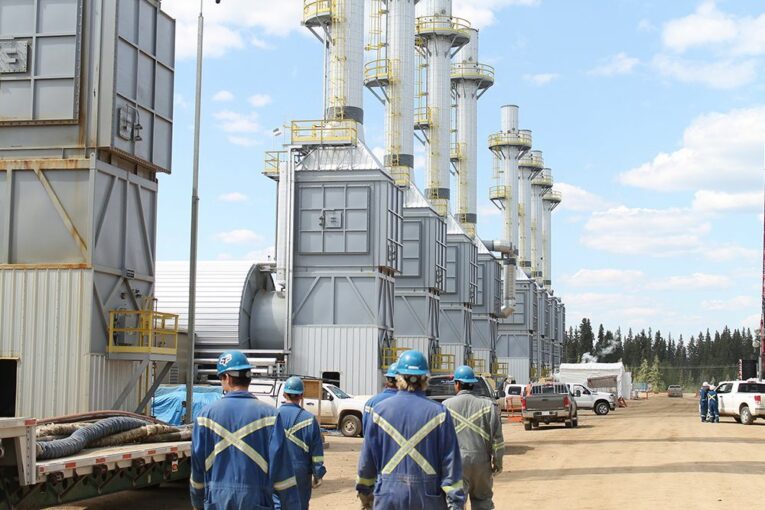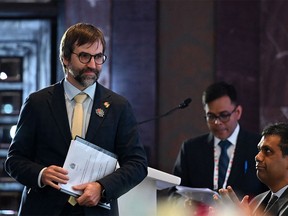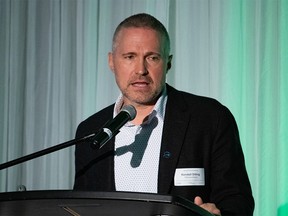
Cenovus Energy CEO Jon McKenzie is puzzled by Ottawa’s talk of phasing out inefficient subsidies to Canada’s oil and gas sector, but doesn’t see it having much effect on decarbonization plans for the oilsands.
Earlier this week, Environment Minister Steven Guilbeault unveiled details of what the federal government calls the Inefficient Fossil Fuel Subsidies Government of Canada Self‑Review Assessment Framework.
It also released the equally catchy Inefficient Fossil Fuel Subsidies Government of Canada Guidelines, which builds upon Ottawa’s previous commitments to end direct public support to the fossil fuel industry.
“I don’t know how they name these pieces of legislation or how they end up positioning them, but if it is what it purports to be, it probably should be a fairly short piece of legislation,” McKenzie told analysts on Thursday.
“I’ve been in this industry for a lot of years and many of those years have been spent in finance. And I certainly remember writing a lot of cheques to the provincial and federal governments. I don’t remember receiving a lot of cheques in return.”
On Monday, the federal environment minister released details on its ongoing plans to halt subsidies to the sector, publishing a yardstick of sorts to assess which tax and non-tax measures are deemed to be an inefficient fossil fuel incentive.
The government says all subsidies will be considered inefficient, unless they enable significant emissions reductions, support clean energy and technology, or support Indigenous economic participation.
Other exemptions include providing essential services to remote communities, supporting abated oil and gas production — such as using carbon capture and storage (CCS) to sequester emissions — or for projects with a credible plan to achieve net-zero by the end of this decade.
“It ensures that the only federal support for oil and gas given to the petroleum sector goes to projects that decarbonize the sector,” Guilbeault told reporters in Montreal.

During the Cenovus’ second-quarter earnings call, McKenzie noted the Calgary-based company paid nearly $4.5 billion in royalties and taxes last year, exceeding the amount earmarked to its capital program.
Although Cenovus reported its net earnings dropped in the second quarter to $866 million, down from $2.4 billion a year earlier — a period of higher commodity prices — he expects the company’s taxes and royalties paid out could be even higher this year.
And what practical effect will the new federal framework have?
“We certainly hear political rhetoric with regard to oil and gas subsidies. We’re just really not sure what it means because, again, we’re not really aware of any oil and gas subsidies for the industry,” McKenzie added.
“I don’t believe it does have any impact on Pathways at all.”
Cenovus is a founding member of the Pathways Alliance, a group of six major oilsands operators collaborating to reach net-zero emissions by 2050.
The alliance has proposed a $16.5-billion carbon capture and storage network, which includes a CO2 transportation pipeline that connects oilsands facilities to an underground storage hub near Cold Lake.
Ottawa has previously pledged to provide up to a 50 per cent investment tax credit for carbon capture projects.
Recommended from Editorial
-

Canada bans some fossil fuel subsidies, meeting decade-old G20 pledge
-

Cenovus lowers upstream production guidance due to wildfires, reports second quarter profits down
-

Varcoe: ‘Gravy to get to 80’ — As oil prices charge higher, outlook brightens for producers and province
-

Varcoe: Oilsands giants warn Canada falling behind U.S. on carbon capture incentives
The Pathways Alliance members have been pressing for additional help from the province and Ottawa to be competitive with larger incentives provided in the U.S. Inflation Reduction Act.
According to Environmental Defence Canada, the federal government provided more than $20.2 billion in financial support and subsidies to the fossil fuel sector in 2022, including $12 billion for loan guarantees and supports tied to expanding the Trans Mountain pipeline.
The group also identified $7.8 billion that Ottawa provides Export Development Canada, a Crown corporation that has provided financing for oil and gas projects around the world.
Julia Levin of Environmental Defence pointed out the sector is now seeking additional subsidies for carbon capture and storage developments.
“We have huge concerns with public money going to carbon capture,” she said in an interview.
Reaction from industry groups was relatively benign to this week’s federal pronouncement.
The Canadian Association of Petroleum Producers said it’s “generally aligned” with Ottawa’s new federal framework, while also noting global demand for energy is rising and oil and gas will play a critical role well beyond 2050.
“We’re pleased to see the guidelines recognize the need for government partnership on projects essential to Canada’s efforts to meet its climate commitments,” Pathways Alliance president Kendall Dilling said in a statement.

University of Alberta energy economist Andrew Leach noted the industry has seen various incentives and government investments made over the decades, such as through the Alberta Oil Sands Technology and Research Authority (AOSTRA) and the Trans Mountain expansion.
“We know there are lots of different spending programs associated with developing the oilsands,” Leach said.
“Is that the right thing to do? Perhaps it is, but not every sector benefits from multibillion-dollar research arms.”
There’s also little doubt the federal government and province receive large amounts of taxes and royalties from the industry. And government support will be required for expensive carbon capture and storage developments to move ahead, said industry analyst Phil Skolnick with Eight Capital in New York.
“These aren’t a high return project, so you need to have a subsidy to make it work,” he said.
Cenovus chief sustainability officer Rhona DelFrari said the Pathways group is moving “full steam ahead” on its foundational carbon capture and storage project, noting bilateral talks are going on between the province and federal government.
“They’re taking this really seriously,” she said.
“The governments understand how important the CCS project is for, not just for our sector, but for the entire country.”
Chris Varcoe is a Calgary Herald columnist.
You can read more of the news on source
